N,N-Bis(cyanoethyl)aniline
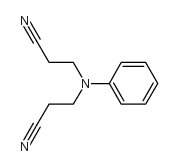
N,N-Bis(cyanoethyl)aniline structure
|
Common Name | N,N-Bis(cyanoethyl)aniline | ||
|---|---|---|---|---|
| CAS Number | 1555-66-4 | Molecular Weight | 199.25200 | |
| Density | 1.105g/cm3 | Boiling Point | 175 - 180 (0.3 torr) | |
| Molecular Formula | C12H13N3 | Melting Point | 81-84 °C(lit.) | |
| MSDS | N/A | Flash Point | 189ºC | |
| Name | 3-[N-(2-cyanoethyl)anilino]propanenitrile |
|---|---|
| Synonym | More Synonyms |
| Density | 1.105g/cm3 |
|---|---|
| Boiling Point | 175 - 180 (0.3 torr) |
| Melting Point | 81-84 °C(lit.) |
| Molecular Formula | C12H13N3 |
| Molecular Weight | 199.25200 |
| Flash Point | 189ºC |
| Exact Mass | 199.11100 |
| PSA | 50.82000 |
| LogP | 2.32036 |
| Vapour Pressure | 5.35E-07mmHg at 25°C |
| Index of Refraction | 1.567 |
Synonym: Section 2 - COMPOSITION, INFORMATION ON INGREDIENTS
Risk Phrases: 20/21/22 40 50 48/23/24/25 Section 3 - HAZARDS IDENTIFICATION EMERGENCY OVERVIEW
Harmful by inhalation, in contact with skin and if swallowed. Limited evidence of a carcinogenic effect. Very toxic to aquatic organisms. Toxic : danger of serious damage to health by prolonged exposure through inhalation, contact with skin and if swallowed. Potential Health Effects Eye: May cause eye irritation. Skin: May cause skin irritation. Harmful if absorbed through the skin. Ingestion: Harmful if swallowed. May cause irritation of the digestive tract. Inhalation: Harmful if inhaled. May cause respiratory tract irritation. Chronic: Not available. Section 4 - FIRST AID MEASURES Eyes: Flush eyes with plenty of water for at least 15 minutes, occasionally lifting the upper and lower eyelids. Get medical aid. Skin: Get medical aid. Flush skin with plenty of water for at least 15 minutes while removing contaminated clothing and shoes. Ingestion: Get medical aid. Wash mouth out with water. Inhalation: Remove from exposure and move to fresh air immediately. If not breathing, give artificial respiration. If breathing is difficult, give oxygen. Get medical aid. Notes to Physician: Section 5 - FIRE FIGHTING MEASURES General Information: As in any fire, wear a self-contained breathing apparatus in pressure-demand, MSHA/NIOSH (approved or equivalent), and full protective gear. Extinguishing Media: Use foam, dry chemical, or carbon dioxide. Section 6 - ACCIDENTAL RELEASE MEASURES General Information: Use proper personal protective equipment as indicated in Section 8. Spills/Leaks: Vacuum or sweep up material and place into a suitable disposal container. Section 7 - HANDLING and STORAGE Handling: Avoid breathing dust, vapor, mist, or gas. Avoid contact with skin and eyes. Use only in a chemical fume hood. Storage: Store in a cool, dry place. Store in a tightly closed container. Section 8 - EXPOSURE CONTROLS, PERSONAL PROTECTION Engineering Controls: Use adequate ventilation to keep airborne concentrations low. Exposure Limits CAS# 1555-66-4: Personal Protective Equipment Eyes: Not available. Skin: Wear appropriate protective gloves to prevent skin exposure. Clothing: Wear appropriate protective clothing to prevent skin exposure. Respirators: Follow the OSHA respirator regulations found in 29 CFR 1910.134 or European Standard EN 149. Use a NIOSH/MSHA or European Standard EN 149 approved respirator if exposure limits are exceeded or if irritation or other symptoms are experienced. Section 9 - PHYSICAL AND CHEMICAL PROPERTIES Physical State: Powder Color: light beige Odor: Not available. pH: Not available. Vapor Pressure: Not available. Viscosity: Not available. Boiling Point: Not available. Freezing/Melting Point: 80 - 88 deg C Autoignition Temperature: Not available. Flash Point: Not available. Explosion Limits, lower: Not available. Explosion Limits, upper: Not available. Decomposition Temperature: Solubility in water: Specific Gravity/Density: Molecular Formula: C12H13N3 Molecular Weight: 199.25 Section 10 - STABILITY AND REACTIVITY Chemical Stability: Not available. Conditions to Avoid: Incompatible materials. Incompatibilities with Other Materials: Strong oxidizing agents, acids, acetic anhydride, acid chlorides, carbon dioxide. Hazardous Decomposition Products: Nitrogen oxides, carbon monoxide, carbon dioxide. Hazardous Polymerization: Has not been reported Section 11 - TOXICOLOGICAL INFORMATION RTECS#: CAS# 1555-66-4 unlisted. LD50/LC50: Not available. Carcinogenicity: N,N-Bis(cyanoethyl)aniline - Not listed by ACGIH, IARC, or NTP. Section 12 - ECOLOGICAL INFORMATION Section 13 - DISPOSAL CONSIDERATIONS Dispose of in a manner consistent with federal, state, and local regulations. Section 14 - TRANSPORT INFORMATION IATA Shipping Name: TOXIC SOLID, ORGANIC, N.O.S.* Hazard Class: 6.1 UN Number: 2811 Packing Group: 3 IMO Shipping Name: TOXIC SOLID, ORGANIC, N.O.S. Hazard Class: 6.1 UN Number: 2811 Packing Group: 3 RID/ADR Shipping Name: TOXIC SOLID, ORGANIC, N.O.S. Hazard Class: 6.1 UN Number: 2811 Packing group: III Section 15 - REGULATORY INFORMATION European/International Regulations European Labeling in Accordance with EC Directives Hazard Symbols: T N Risk Phrases: R 20/21/22 Harmful by inhalation, in contact with skin and if swallowed. R 40 Limited evidence of a carcinogenic effect. R 48/23/24/25 Toxic : danger of serious damage to health by prolonged exposure through inhalation, contact with skin and if swallowed. R 50 Very toxic to aquatic organisms. Safety Phrases: S 28A After contact with skin, wash immediately with plenty of water. S 36/37 Wear suitable protective clothing and gloves. S 45 In case of accident or if you feel unwell, seek medical advice immediately (show the label where possible). S 61 Avoid release to the environment. Refer to special instructions/safety data sheets. WGK (Water Danger/Protection) CAS# 1555-66-4: No information available. Canada CAS# 1555-66-4 is listed on Canada's NDSL List. CAS# 1555-66-4 is not listed on Canada's Ingredient Disclosure List. US FEDERAL TSCA CAS# 1555-66-4 is listed on the TSCA inventory. SECTION 16 - ADDITIONAL INFORMATION N/A |
| Hazard Codes | Xi:Irritant; |
|---|---|
| Risk Phrases | R36/37/38 |
| Safety Phrases | S26-S36 |
| WGK Germany | 3 |
|
~% 
N,N-Bis(cyanoet... CAS#:1555-66-4 |
| Literature: Journal of the American Chemical Society, , vol. 74, p. 1096 |
|
~% 
N,N-Bis(cyanoet... CAS#:1555-66-4 |
| Literature: Journal of the Chemical Society, , p. 67,71 |
|
~% 
N,N-Bis(cyanoet... CAS#:1555-66-4 |
| Literature: Journal of the Chemical Society, , p. 1536,1542 |
|
~% 
N,N-Bis(cyanoet... CAS#:1555-66-4 |
| Literature: Journal of the Chemical Society, , p. 1536,1542 |
|
~% 
N,N-Bis(cyanoet... CAS#:1555-66-4
Detail
|
| Literature: Journal of the Chemical Society, , p. 67,71 |
| 3,3'-Phenylimino-di-propionitril |
| EINECS 216-306-4 |
| N,N-Bis(2-cyanoethyl)aniline |
| bis-2-cyanoethyl aniline |
| MFCD00019855 |
| 3,3'-(Phenylimino)dipropionitrile |
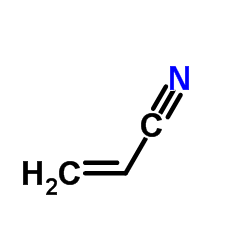

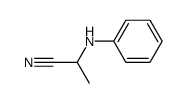
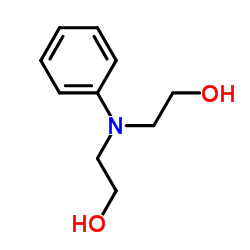

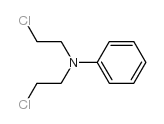
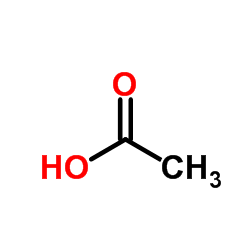
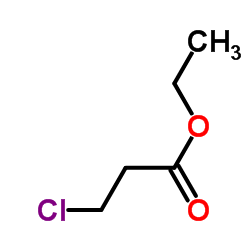 CAS#:623-71-2
CAS#:623-71-2![Propanenitrile,3,3'-[(4-formylphenyl)imino]bis- structure](https://image.chemsrc.com/caspic/427/17354-79-9.png) CAS#:17354-79-9
CAS#:17354-79-9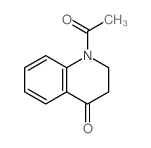 CAS#:64142-63-8
CAS#:64142-63-8